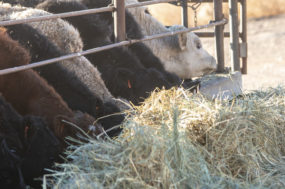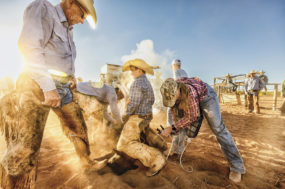If so, set your schedule also for the 22nd Annual Cattlemen’s College – the convention’s annual offering of stimulating and thought-provoking topical discussions and presentations for the beef industry.
Events are held Feb. 3-4, 2015 at the Gonzalez Convention Center. Register online at National Cattlemen's Beef Association.
Feeding to Increase the Quality, Consistency and Competitiveness from Market Cows
Gary Smith, Keith Belk,
Daryl Tatum, Dale Woerner
Colorado State University
This hands-on class will help the attendee improve the quality, consistency and competitiveness of beef produced from market cows; identify production practices that improve the value of market cows; determine the effects of varying levels of supplemental feeding; recognize the differences between different types of cows; and learn value concepts at the feedlot, packing plant and retail levels. Moderated by Gary Smith.
Understanding the Economics of Herd Rebuilding
Derrell Peel
Oklahoma State University
This course will describe the multiple reasons the nation’s cow herd has dropped to levels not seen in 60 years. It will provide a comparison of the profitability of calves versus crops, changes in the use of pastureland, comparison of demand and consumption, how government programs influence herd rebuilding, where cow herd expansion will be located and who will be retaining heifers to rebuild the cow herd.
Outlook for the Newer Reproductive Strategies
George Seidel
Colorado State University
If you have an interest in improving the reproductive efficiency of your cow herd, this is a class for you. One of the nation’s most respected beef cattle reproductive physiologists will discuss cloning, transgenics, in vitro fertilization, genotyping embryos and checking cattle for euploidy, and sexing sperm.
Grass-finished vs. Traditional Cattle: Reasons for Each
Darrell Wood and Darrell Sweet
California
Two successful ranchers from California discuss why they have chosen different production systems: natural and traditional. Learn about the challenges, the opportunities and profit potential of each system.
Why are the Export Markets for Beef so Valuable? Panel Discussion
Jay Theiler, AgriBeef
Larry Corah, Certified Angus Beef
Paul Clayton, U.S. Meat Export Federation
Three export authorities will discuss the types of cattle that produce exportable beef, the high-value cuts most in demand outside this country and the beef variety meats that are valued overseas.
Confident Cooking with Beef
Laura Hagen
Wendy Neuman
National Cattlemen’s Beef Association
Gain a better understanding of the challenges consumers face working with beef in the kitchen and what the Beef Checkoff is doing to provide solutions. Topics will include selecting different cuts of beef, defrosting ground beef and preparing beef dishes using proper cooking methods to ensure optimal beef-eating experiences.
A Multi-Dimensional Approach to Cattle Business Management: Balancing Work and Life
Robin Falkner
Michael Nichols
Zoetis
Strategic and managerial business decisions impact cattle, people, finances and family. This session will address a multi-dimensional approach to cattle business management and the ramifications business decisions have on the different dimensions of our businesses and our lives.
Generational Transfer: How Do We Pass on the Ranch to the Kids (or should we?)
George Haynes
Montana State University
This class helps prepare for transfer of ownership of the ranch to the next generation. Among key topics: handing over ranch decision-making roles; meeting demands of family members, owners and ranch employees; and allowing the next generation to put their stamp on the business.
Developing a Grazing Management Plan for Rebuilding the Herd
Ted McCollum
Texas A&M University
This class will focus on production planning and estimating forage and nutrient requirements across the production year, identifying and filling gaps in forage production and nutritional value, forage complementarity, and forage types and roles in a forage system.
Genetics to Fit Differing Environments
Matt Spangler
University of Nebraska – Lincoln
The program will focus on decision support and the merger of genetic selection tools under different production environments and marketing objectives. It will summarize the current state of bull selection and determine where as an industry we need to be.
The program will also provide information on the development of and combinations of genetics that fit individual circumstances in a simple, easy form.
Developing a Healthier, More Profitable Calf
Mark Hilton
Purdue University
In this session, one of the nation’s premier extension veterinarians will provide insight into saving more calves and increasing weaning percentages. Specific topics and tips to be covered include: proper pre-calving nutrition and vaccination of the dam, optimum calving environment, maximizing colostrum intake and enhancing marketing of calves.
Wealth Management: Protecting Profits
Larry Kopsa
Kopsa Otte
Homer Buell, Nebraska rancher
In this session, a well-known rancher and a respected CPA join forces to discuss wealth management and where it makes sense to put funds. Larry Kopsa will describe costly mistakes people make in good years and new tax laws that impact agriculture. Homer Buell will follow with information on giving back to our communities.
Role of Ground Beef in Today’s Market
John Lundeen
National Cattlemen’s Beef Association
Tom Brink, Brink Consulting
In this session, learn about the ongoing growth of ground beef, the longer-term trend toward leaner ground beef products, plus what consumers love about – and how they use – the product. The program will also address what the market says about value, where to direct resources in satisfying consumer demand.
Succession Planning II
Dick Wittman
Wittman Farms, Lapwai, Idaho
This seminar tackles a number of sensitive issues related to family business succession. It addresses areas where crucial conversations need to take place and establishes an actionable framework for how to start and finish a transition planning process.
Working with Family for Generational Success
Kevin & Lydia Yon
Ridge Spring, South Carolina
Brad & Jody Bellah
Throckmorton, Texas
A panel discussion on techniques that work to maintain successful relationships on the ranch, including four things first-generation cattle producers must have – priorities, a plan, persistence and patience.
In addition, information on being in the cattle business without “inheriting the ranch” and remembering that people are always watching what you do.
Future of Cattle Feeding with a Declining U.S. Cow Herd
Dr. Pete Anderson
Midwest PMS, LLC
All segments of the industry need to adapt to serve domestic and global markets. For instance, use of technology and feeding to heavier carcass weights are not only necessary for the industry but most profitable for individual producers. Cattle feeders must consider quality, quantity and efficiency in order to maximize revenue per animal.
Ethical Treatment for the Prevention of Disease
Dave Daley
California State University – Chico
What is the consumer asking of America’s beef producers? This class will cover the most relevant welfare issues for the beef industry. Included in the presentation will be how to lose the argument on animal welfare, producer perspectives on animal welfare, major issues and impractical solutions for the next decade.
The Veterinary Feed Directive: Future Use of Antibiotics
Mike Apley
Kansas State University
Will the availability of antibiotics for food animal health become restricted? Pre-eminent authorities on the issue will address this topic as it affects cattle producers, including the latest proposals for antibiotic use in beef production, FDA restrictions on both injectable and water products, and how it will affect the industry over the next 50 years.
Land and Water Rights Issues in the U.S.
Dustin Van Liew, Colin Woodall
National Cattlemen’s Beef Association
Water plays an integral role in producing beef. And federal agencies create rules and regulations daily that impact our ability to utilize that water. Just what is the role of government in controlling water resources and the land under and around them?
The Science of Grilling Beef
Jeff Savell
Texas A&M University
Kevin Kolman
Weber-Stephen Products LLC
Beef is on the minds of cattle producers when they think about grilling, smoking or barbecuing. There are a variety of beef cuts that work for each method of cookery, and understanding the art and science of matching the cut to the cookery method helps ensure maximum enjoyment each time.
Management or Leadership: How Do You Tell the Difference?
Rick LaPlante
Triple L Cattle, Powell, Wyoming
This is an excellent class for those just starting in the cattle business. LaPlante, who had an almost-20-year successful career with Microsoft, now runs his own cattle company in Wyoming with his wife.
In this session, he will focus on what leadership is and the differences between leadership and management, why leadership can be a difficult proposition and how to develop your “leader’s voice” and skills.
Telling the Beef Story
Joe Hansen, Shari Nelson
National Cattlemen’s Beef Association
Learn about how to develop social media skills. Among topics will be why social listening is important and how it helps to build the digital strategy for important issues, management and promotion programs, how the beef industry is using social platforms at the national level, how cattlemen can use and interact with each social platform, and the commitments involved in and “how-to” of blogging.
Beef entree sponsored by Certified Angus Beef
Guest speaker Max Armstrong
Summarizing the implications of Cattlemen’s College session information for producers will be Max Armstrong, one of America’s most widely recognized and highly regarded agricultural journalists. ![]()







